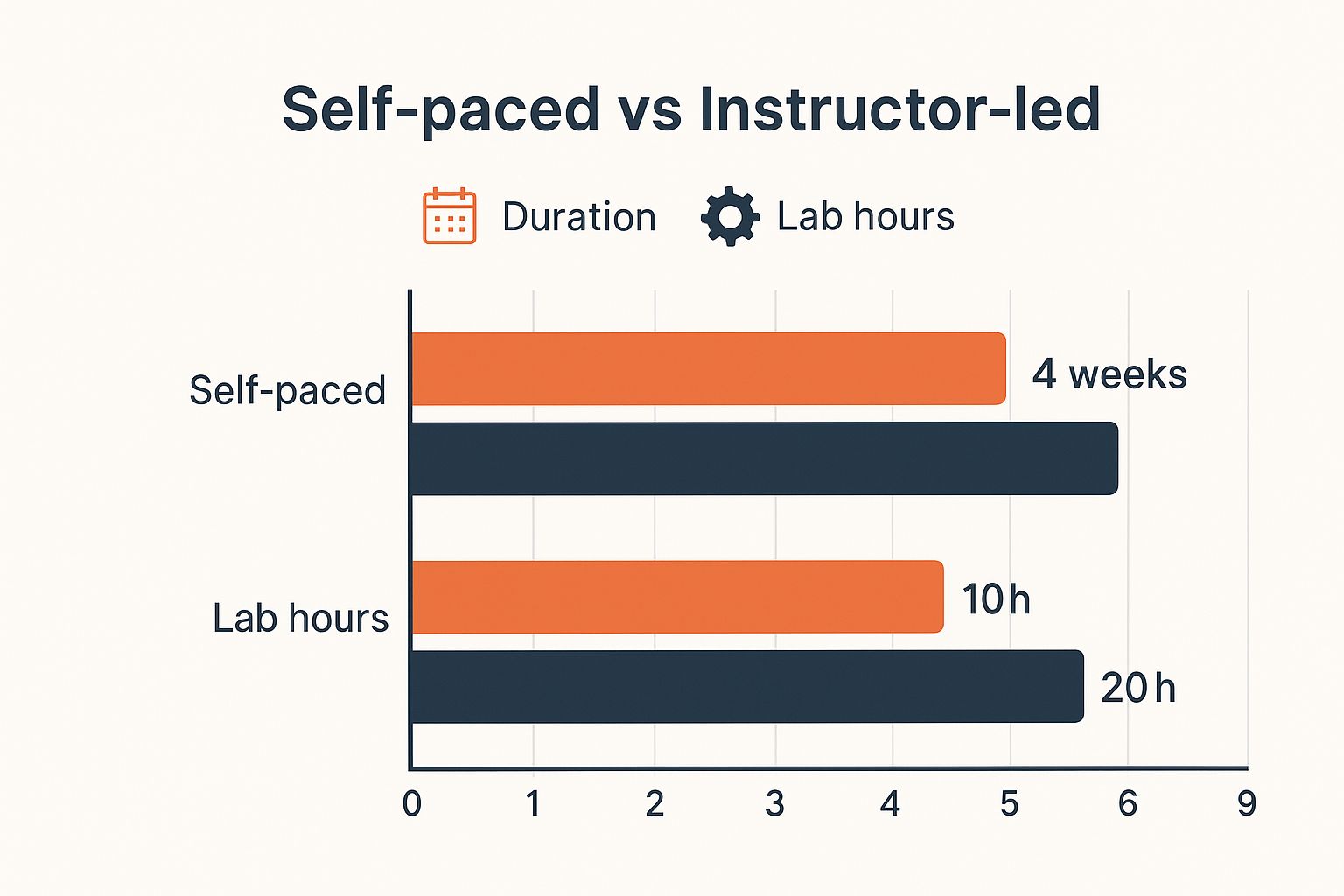Think of a contractor management course as your operational playbook. It gives you a reliable, repeatable system for finding, managing, and reviewing external companies to make sure your projects finish on time, on budget, and to the right standard. This kind of training isn't about memorising regulations; it’s about building practical skills to handle contractors effectively in the real world.
Understanding the Purpose of Contractor Management Training
Managing contractors is a lot like a head coach managing a sports team. Each player, or in this case, each contractor, has a specific role and skill set. The coach's job is to pull them all together with a solid strategy so they work efficiently to win the game. A contractor management course gives you that coaching strategy.
Without a formal system, bringing contractors onto a worksite can open the door to huge risks and inefficiencies. Projects start falling behind, budgets can easily spiral, and simple miscommunications can snowball into major quality problems. This is exactly where dedicated training proves its worth.
The Core Goal is Control and Consistency
At its heart, a contractor management course is designed to give you a repeatable process for every stage of the contractor lifecycle. This covers everything from the initial pre-qualification checks right through to the final project sign-off. The aim is to create solid consistency in how you handle every external party that steps onto your site.
This structured approach helps you answer important questions before they turn into problems:
- Is this contractor properly qualified and insured for the work they’re about to do?
- How will we communicate daily progress and deal with any issues that crop up?
- What are the clear, measurable standards we’ll use to judge their performance?
- How do we make sure they follow our site-specific rules and procedures?
When you have a system in place, you stop reacting to problems and start managing the entire process. For a deeper look at these fundamentals, you can learn more about what is contractor management in our guide.
From Theory to Practical Application
A good course won't waste your time on abstract theories. It’s focused on the tools and techniques you can start using straight away. It takes all those dense legal obligations and industry best practices and turns them into a series of practical, actionable steps.
For instance, instead of just talking about risk, it will teach you how to build a pre-qualification checklist that filters out high-risk contractors before they even get a chance to bid on a job.
The real value of a contractor management course isn't just learning what to do. It’s learning how to implement a system that actually works for your specific workplace, whether that’s a busy manufacturing plant or a large-scale construction project.
The table below breaks down the key skills you’ll walk away with and how they apply directly to your daily responsibilities.
Core Skills from a Contractor Management Course
This table summarises the essential, practical skills you will develop by completing a contractor management course.
| Skill Area | Practical Application |
|---|---|
| Contractor Selection & Vetting | Creating a solid checklist to verify licences, insurance, and past performance before hiring. |
| Onboarding & Induction | Developing a standard site induction that covers access, emergency procedures, and reporting protocols. |
| Performance Monitoring | Using key performance indicators (KPIs) to track progress and quality against the agreed contract terms. |
| Risk Assessment & Mitigation | Identifying job-specific hazards and ensuring control measures are properly implemented before work begins. |
| Contractual & Legal Oversight | Understanding both your responsibilities and the contractor's obligations to avoid disputes and compliance breaches. |
| Subcontractor Management | Implementing a system to ensure your main contractor is properly managing their own subcontractors. |
Ultimately, these skills combine to form a complete framework that protects your business, your people, and your projects from the risks that come with engaging external workers.
Who Actually Needs This Type of Training?

A contractor management course isn’t just for a small group of specialists. The skills you learn are essential for anyone whose job involves bringing external workers onto a site and making sure they do the job right.
It’s less about your official title and more about what you do day-to-day. If your results depend on getting performance from outside help, then this training is for you. It gives you a structured system to solve the same recurring problems that trip up so many managers. It’s about shifting from a reactive mindset, where you’re constantly putting out fires, to a proactive one where you’re in control from the very start.
Project Managers on Complex Sites
Picture a project manager running a massive construction site with dozens of subcontractors. Their biggest headache? Coordination and risk control. A new plumbing crew might be fantastic at their trade, but without proper onboarding, they could easily breach a critical site-specific rule they knew nothing about.
This is where the training pays off. It gives that project manager a solid framework for vetting, onboarding, and keeping an eye on every single subcontractor. They learn how to build a pre-qualification checklist that flags potential red flags before a contract is even on the table. For them, it's all about stopping delays and preventing costly mistakes that come from inconsistent management.
Procurement Officers Sourcing Suppliers
Procurement officers and contract administrators are at the front line of contractor engagement. Their world revolves around sourcing, vetting, and locking in formal agreements with suppliers. A poorly written contract doesn't just cause confusion; it can leave the entire company exposed to serious financial and legal risk.
This training gives them the know-how to write clearer, tougher, and more effective contract terms. They learn precisely which clauses are non-negotiable for defining performance expectations, payment schedules, and compliance obligations. It helps them move past simply chasing the lowest quote to finding a genuinely reliable partner who actually understands what’s expected of them.
The real game-changer for procurement professionals is learning how to weave accountability directly into the contract itself. It makes managing performance down the track much easier because the rules of engagement are crystal clear from day one.
Site Supervisors Managing Daily Work
Site supervisors are the ones on the ground, making sure the work actually gets done. They manage the daily interaction between their own teams and the various contractors on site. Their biggest challenge is often getting a temporary, diverse workforce to stick to the same operational procedures.
For instance, they need to be certain an external electrical crew follows the exact same lockout/tagout procedures as their in-house team. A contractor management course provides practical, real-world methods for communicating these rules during inductions and checking they’re being followed through regular site inspections.
This kind of training is becoming more critical across Australia, as major infrastructure projects ramp up the demand for skilled contract and project management professionals. In fact, some reports suggest Australia will need millions of new project management-related recruits annually up to 2030, particularly in construction and other key sectors. This training is fundamental to building the skills needed to juggle complex contracts and supplier relationships effectively. You can discover more insights about project management trends in Australia and the growing demand for talent.
Ultimately, a contractor management course is for anyone who answers "yes" to these questions:
- Do you hire external companies or sole traders to perform work on your sites?
- Are you accountable for the budget, timeline, or quality of their output?
- Do you need a consistent, foolproof way to make sure every contractor meets your company's standards?
If that sounds familiar, the practical skills from this training will directly upgrade your ability to manage your projects and get the results you need.
A Realistic Look at the Course Curriculum

A good contractor management course isn't about memorising a textbook of regulations. It's designed to give you a practical, step-by-step system for handling the entire contractor lifecycle, from the first handshake to the final sign-off. The whole curriculum is built around real-world problems you actually face on-site.
So, instead of just listing topics, let's look at what's under the hood. We'll break down what these modules actually teach you and, more importantly, why each one is critical for keeping your projects on track and your business out of trouble.
The core of any quality course is broken down into logical stages that mirror a real project timeline. You start with the groundwork of finding the right people, move into managing them on the job, and finish by wrapping things up cleanly.
Module 1: Spotting Problems Before They Happen
This is often called Risk Assessment, but a better way to think of it is learning how to spot red flags before a contractor even steps foot on site. It’s all about proactive problem-solving, not reactive damage control. A course will teach you to look beyond a cheap quote and dig into what really matters.
Essentially, you’ll learn how to build a pre-qualification process that acts as a tough but fair filter, weeding out contractors who might cause major headaches down the line.
Practical skills you'll walk away with include:
- Checking financial stability: You'll learn how to request and interpret documents to make sure a potential contractor isn't on the verge of going bust mid-project, leaving you high and dry.
- Verifying insurance and licences: This goes beyond just ticking a box. You'll learn what specific types of cover are non-negotiable for different jobs and how to confirm they're current and valid.
- Assessing past performance: The training will show you how to properly check references so you're not just taking their sales pitch at face value.
The biggest takeaway from this module? The most effective way to manage contractor risk is to avoid bringing high-risk contractors onto your project in the first place. A solid vetting process is your first and best line of defence.
Imagine you're hiring a scaffolding company for a multi-storey build. A low quote might be tempting, but this module teaches you to first check their public liability insurance, verify their high-risk work licences are valid in your state, and actually call their last two clients to ask about punctuality and equipment condition. That simple process can prevent a catastrophic failure.
Module 2: Staying Out of Legal Trouble
This part of the course covers Compliance and Legal Duties. Don't worry, it’s not about turning you into a lawyer. It's about giving you a crystal-clear understanding of your specific obligations under Australian law when you engage external workers. Getting this wrong can lead to massive fines and legal headaches you just don't need.
You'll cover the practical side of laws like the Work Health and Safety (WHS) Act, focusing squarely on how it applies to contractor relationships. The goal is to make sure you know exactly who is responsible for what.
A typical lesson would walk through a scenario like this: a subcontractor you hired gets injured on your site. Who is legally responsible? The course untangles the concept of shared duty of care, explaining what steps you must take to prove you’ve done your part to provide a safe work environment. That kind of clarity is invaluable.
Module 3: Keeping an Eye on the Work
Once a contractor is on-site, you need a system for Performance Monitoring. This module is all about tracking progress and quality without having to micromanage every single task. It teaches you how to set clear, measurable expectations right from the get-go.
You will learn to use simple but effective tools and methods, such as:
- Key Performance Indicators (KPIs): Setting relevant metrics to track progress against the project schedule and budget.
- Regular Site Inspections: Creating structured checklists for site walk-throughs to systematically check for quality and adherence to site rules.
- Formal Review Meetings: Establishing a regular meeting rhythm to discuss progress, tackle issues early, and document everything in writing.
This isn’t about catching people out. It’s about creating an open line of communication so that small issues can be fixed before they become big, expensive problems.
Module 4: Managing the Extended Team
Many principal contractors get caught out by issues caused not by their direct contractor, but by a subcontractor they brought on. A solid contractor management course will always include a module on Subcontractor Oversight.
This teaches you how to make your main contractor accountable for the people they bring on-site. You’ll learn to write clauses into your primary contract that require your approval for any subcontractors and mandate that they pass the exact same vetting process you use. It creates a chain of responsibility and prevents your site from being filled with unknown, unvetted workers.
Why Australian Industries Are Doubling Down on This Training
Across Australia, certain industries are making a serious investment in formal contractor management training. This isn't just about ticking a professional development box; it's a direct response to the complexity and high-stakes nature of modern projects. For sectors like construction, mining, and major government works, getting contractor management right is the foundation of success.
These industries aren't just juggling one or two external companies. They're often orchestrating massive webs of contractors and subcontractors, where a single weak link can trigger a cascade of problems. This push for formal training is about modernising their talent pool, which fits with broader workforce development strategies. A proper course gives managers the practical toolkit they need to handle the unique pressures of their field.
The Construction Sector Demands Rigour
The Australian construction industry is the classic high-pressure environment. Projects live and die by tight deadlines, complex supply chains, and the daily headache of coordinating dozens of specialist trades on one site. A small delay from one subcontractor can easily derail the entire project schedule, leading to massive financial penalties.
A contractor management course gives construction managers a structured system to bring order to this chaos. They learn how to build robust vetting processes, establish clear lines of communication, and monitor performance so that nothing is left to chance. This is vital in an industry where disputes and poor performance can quickly spiral into huge cost overruns.
The Australian construction sector, making up about 9% of the national GDP, is a huge driver for these advanced skills. As government infrastructure projects and sustainability goals make contracts more intricate, the need for skilled oversight only grows. Industry reports from early 2025 are clear: effective contractor management is the key to navigating these challenges and dodging costly project delays. You can read more on the state of the Australian construction industry.
Mining and Resources: All About Risk Control
When you step into the mining and resources sector, the operational risks are on another level. Sites are often in the middle of nowhere, the work is inherently dangerous, and the regulatory oversight is incredibly strict. Simply put, companies in this industry cannot afford to have unvetted or poorly managed contractors operating heavy machinery or handling critical maintenance.
This is where targeted training comes in. It equips managers with systematic methods for assessing and controlling risk. They learn to build pre-qualification systems that check everything: a contractor's specific skills, their safety record, their insurance coverage, long before they ever set foot on site. It’s this methodical, front-footed approach that maintains operational integrity and satisfies those stringent legal obligations.
Government Projects and the Need for Strict Compliance
Government infrastructure projects, whether it’s a new railway or a public hospital, are built under a microscope. Public accountability is paramount, and procurement is wrapped in tight, non-negotiable rules. Managers overseeing these multi-million dollar projects have to ensure every single contractor and subcontractor ticks every single compliance box.
A contractor management course hits this nail on the head. It provides a clear framework for navigating government procurement protocols, documenting every decision, and maintaining a transparent audit trail that can withstand scrutiny. For project managers in the public sector, this training isn't a nice-to-have; it's what gives them the confidence and competence to deliver projects that meet all legal and community expectations, ensuring every taxpayer dollar is accounted for.
Choosing the Right Course Format and Provider
Once you've decided a contractor management course is the right move, the next big question is: which one? With a heap of options out there, from online courses you can do at home to in-person workshops, the choice really boils down to your learning style, schedule, and budget.
Getting this right from the start is crucial, so it pays to spend a bit of time exploring various training formats. What works for one person might be a complete miss for another.
Online Self-Paced Courses
Think of this as the 'learn on your own terms' option. Online self-paced courses are built for flexibility, making them a great option for busy professionals juggling hectic work schedules. You can chip away at modules whenever you find a spare hour, whether that’s first thing in the morning or late at night.
The catch? That freedom demands self-discipline. With no set class times or a trainer chasing you for homework, it's easy to let things slide. You also miss out on the live back-and-forth chats with peers and instructors that can really help lock in complex ideas.
Live Virtual Classrooms
Live virtual classrooms are a fantastic middle ground. You get the convenience of learning from home or the office but with the structure and accountability of scheduled, instructor-led sessions. It’s the best of both worlds.
This format allows for real-time Q&A, group discussions, and that direct connection with an expert. It's a great fit if you value live teaching but can't justify the travel for an in-person workshop. The only real downside is that you’re locked into a fixed schedule, which doesn’t work for everyone.
This infographic gives a quick snapshot of how the time commitment can differ.

As you can see, while self-paced courses might look shorter on paper, the instructor-led options often pack in more dedicated, hands-on lab or practical hours. It’s a classic case of quality over quantity.
In-Person Workshops
For those who learn best by doing and interacting, nothing beats a traditional in-person workshop. The face-to-face engagement with instructors and the chance to network with other professionals in your field are massive pluses. These sessions are perfect for getting your hands dirty and working through real-world scenarios as a group.
The trade-off is pretty straightforward: cost and time. In-person courses are almost always the priciest option when you add up travel, accommodation, and time off work. They also demand you be in a specific place at a specific time, offering zero flexibility.
To help you weigh it all up, here’s a quick comparison of the most common course formats.
Comparing Contractor Management Course Formats
| Format | Best For | Potential Drawbacks |
|---|---|---|
| Online Self-Paced | Professionals with unpredictable schedules who are highly self-motivated. | Requires strong discipline; lacks immediate instructor feedback and peer interaction. |
| Live Virtual Classroom | Learners who want instructor-led structure and interaction without the travel. | Tied to a fixed schedule; requires a reliable internet connection. |
| In-Person Workshop | Hands-on learners who value networking and immersive, practical group work. | Highest cost and time commitment; offers the least flexibility. |
Ultimately, the best format is the one that fits your life and helps you learn most effectively.
What to Look for in a Provider
Beyond the delivery style, the quality of the training provider is what makes or breaks the experience. A great course is about more than just a slick website or a fancy certificate at the end.
Here’s a quick checklist to help you sort the good from the bad:
- Real-World Experience: Are the trainers people who have actually been there and done that? Look for instructors with a background in fields like construction, manufacturing, or mining. Their on-the-ground stories are worth their weight in gold.
- Industry Recognition: Is the course accredited or recognised by relevant Australian industry bodies? This is usually a solid stamp of quality and shows the content is up to scratch.
- Local, Relevant Case Studies: The best courses use local examples. A case study on an Australian construction project will hit a lot closer to home than a generic one from overseas.
- A Practical Toolkit: Does the course give you practical tools like checklists, templates, and frameworks you can start using on Monday morning? For a great example of what a practical curriculum should include, check out these risk management and compliance courses.
This practical focus is a non-negotiable, especially in government sectors where robust contract governance on public projects is vital. Many government academies in Australia offer specialised training that walks public sector professionals through the entire contract lifecycle, from initial setup and performance monitoring right through to dispute resolution.
Choosing the right course isn't just about ticking a box. It's about finding a format and provider that genuinely line up with your professional goals and how you learn best. A bit of research now will pay dividends later.
How to Apply Your New Skills Immediately
Finishing a contractor management course gives you a solid new toolkit, but the real value comes from putting those tools to work straight away. Learning is one thing; application is what drives actual results on your projects. The key is to turn your new knowledge into practical actions that make an immediate impact.

Don't let your notes gather dust. The goal here is to build a clear bridge from the classroom to the worksite. Start by picking one or two high-impact areas where you can apply what you've learned.
Small, focused changes are often far more effective than trying to overhaul everything at once. This approach builds momentum and demonstrates the value of your training to the wider business.
Create Your Post-Course Action Plan
Use the skills you've gained to review and improve your existing processes. A simple, actionable checklist is the best way to start making a real difference.
Here are a few practical steps you can take this week:
Review your current onboarding process. Look at your contractor induction with fresh eyes. Does it clearly cover your site-specific rules, or is it just a generic presentation? Use what you learned to add specific, actionable information that a new worker needs on their first day.
Update your pre-qualification checklist. Your course would have covered risk assessment in detail. Apply this by adding three new questions to your vetting checklist. These could be about a contractor's recent performance history, their management of subcontractors, or even their financial stability.
Create a standard performance review template. Draft a simple, one-page template for reviewing your key suppliers. Include sections for meeting project deadlines, quality of work, and adherence to site rules. This creates a consistent way to measure performance and provide clear, useful feedback.
The most valuable outcome of any training is tangible improvement. By focusing on these small, practical updates, you immediately translate theory into a better, more controlled system for managing every contractor on your site.
Using Technology to Support Your System
As you start making these improvements, you'll likely notice gaps where manual processes are slowing you down. Spreadsheets and paper forms can only take you so far. This is often the point where organisations look for better tools to support their new, more organised approach.
Modern systems can help you put your new skills into practice by automating many of the steps you've just learned. For a clear idea of how this works in a real-world setting, explore the benefits of dedicated contractor management software. These platforms are designed to help you implement the very systems taught in a quality course, from vetting and onboarding to performance tracking and final sign-off.
Got questions? You're not alone. When people are thinking about enrolling in a contractor management course, a few practical questions always pop up. Let's run through the common ones.
How Long Does a Typical Course Take?
There's no single answer here, it really depends on the format you choose and how much time you can block out.
- Online, self-paced courses are the most flexible. You could knock one over in a few dedicated days or chip away at it over a couple of weeks. It’s entirely up to you.
- Live virtual classrooms usually follow a more structured schedule, often spread out over several weeks with a session or two each week.
- In-person workshops are the most intensive. Think of them as a bootcamp, typically running for one to three full days.
Is There a Final Exam or Certification?
Most quality courses will wrap up with some kind of assessment to make sure you've grasped the key concepts. This isn't about high-pressure exams; it's more about confirming you know your stuff. It might be a multiple-choice quiz, a hands-on case study, or a small project.
Once you pass, you'll almost always get a certificate of completion. This is more than just a piece of paper, it’s solid proof for your CV that you’ve formally trained in contractor management principles. It tells employers you have a specific, valuable skill set.
A formal certificate is clear evidence to your current or future employers that you’ve invested in mastering the systems needed to manage contractors effectively and reduce organisational risk.
What is the Average Cost in Australia?
The price tag for contractor management courses in Australia varies quite a bit.
- Basic online courses can start from just a few hundred dollars.
- More in-depth virtual or in-person workshops, especially those run by seasoned industry experts, can range anywhere from $1,000 to over $3,000.
Generally, the cost reflects the depth of the content, the instructor's real-world experience, and the level of support you get. It’s always worth checking if your company has a professional development fund that could cover the cost.
Can I Get a Course Tailored for My Company?
Absolutely. Many training providers offer custom courses designed specifically for corporate teams. This is a brilliant option if you need to get a whole group of managers, supervisors, or procurement officers on the same page, fast.
A tailored program can focus on the exact challenges your industry faces, whether that’s managing an army of subcontractors on a major construction site or vetting suppliers in a tightly regulated field. The content can be tweaked to align with your company's internal policies, making every lesson immediately useful. It’s the best way to ensure the training hits the mark and solves your team’s real-world problems.
Nailing contractor management is a critical skill, but it’s a whole lot easier when you have the right system supporting you. Safety Space gives you an all-in-one platform to put your training into practice, helping you vet, onboard, and monitor contractors with a process that's clear and consistent. Book a free demo today to see how you can simplify compliance and protect your projects.
Ready to Transform Your Safety Management?
Discover how Safety Space can help you build a safer, more compliant workplace with our comprehensive safety management platform.
Book a Free DemoRelated Topics
Safety Space Features
Explore all the AI-powered features that make Safety Space the complete workplace safety solution.
Articles & Resources
Explore our complete collection of workplace safety articles, tools, and resources.
